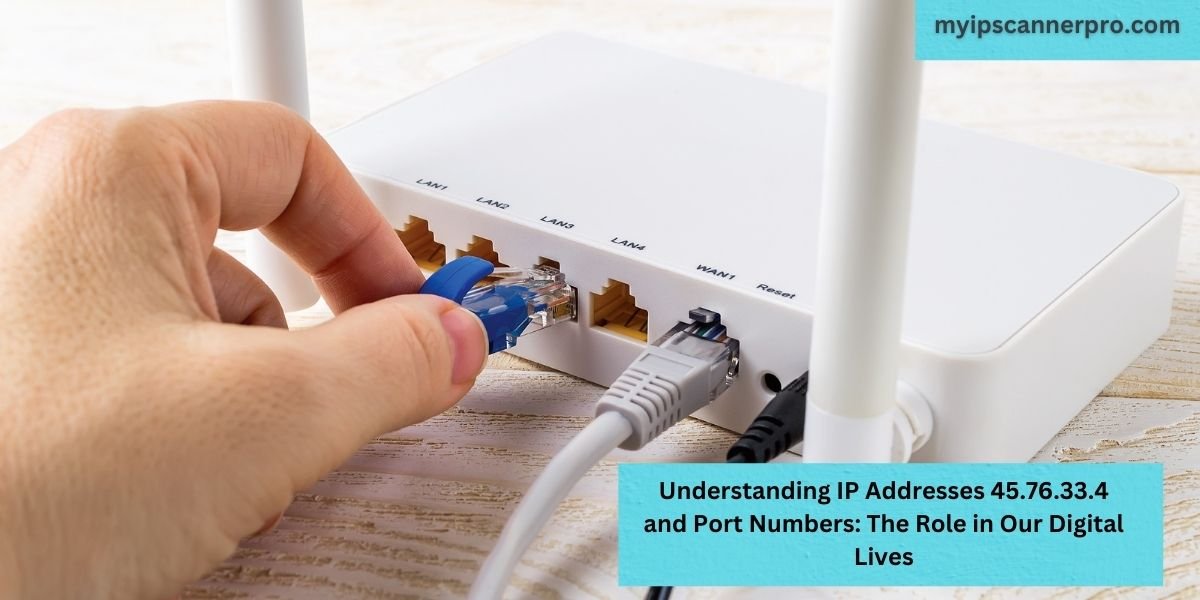If you’ve ever connected to the internet and technology, you’ve interacted with something called an IP address—whether you knew it or not. These addresses are like the digital “home” where your devices live online. But what exactly is an IP address, and how do specific ones like 45.76.33.4 work? Let’s break down these concepts in simple terms, and explore how IP addresses, like 45.76.33.4, and port numbers play a role in our digital lives.
What is an IP Address?
An IP address (Internet Protocol address) is a unique set of numbers assigned to devices connected to the internet. Think of it like the address of a house in the real world. Just as you need a home address to send mail, your device needs an IP address to send and receive data across the internet.
IP addresses come in different formats, most commonly IPv4 (which uses numbers like 45.76.33.4) and IPv6 (which uses a much longer string of letters and numbers).
Read Also: www.worldwidesciencestories.com PCNOK | Pdf Rani.com | 127.0.0.1:57573
Understanding 45.76.33.4
The IP address 45.76.33.4 is a specific example of an IPv4 address. In this address, each of the four numbers (known as octets) is separated by periods, and the numbers can range from 0 to 255. But what does this specific combination of numbers tell us?
The IP address 45.76.33.4 could refer to a device anywhere in the world. It might be a web server, a personal computer, or even a router. What’s important to understand is that every IP address, including 45.76.33.4, serves a vital role in identifying and enabling communication between devices on a network.
What is a Port Number?
While an IP address tells you where a device is on the internet, a port number tells you what service or process on that device you’re communicating with. Think of it as the room number in a large building. While the building (or IP address) gives you the general location, the room (or port number) lets you know where exactly to deliver the message.
For example, port 80 is commonly used for HTTP (web traffic), while port 443 is used for HTTPS (secure web traffic).
Read Also: Michujobs | www.mywirelesscoupons.com About | sun pharma webmail | 127.0.0.1:62893
Breaking Down 45.76.33.4
When we look at an address like 45.76.33.4, we are seeing an IPv4 address in action. But what makes this address unique?
- 45.76: These first two octets are part of a larger range of addresses that might belong to a specific service provider or region.
- 33.4: The last two octets usually refer to a specific device or sub-network within that larger provider range.
By combining these numbers, the network can route data specifically to and from 45.76.33.4, ensuring that the correct device receives the correct information.
Practical Applications
IP addresses like 45.76.33.4 are essential for many activities, including:
- Accessing websites: Every time you visit a site, your device connects to a server’s IP address.
- Email communication: Emails are sent and received using specific IP addresses.
- Gaming and streaming: Online services rely on IP addresses to deliver content to the right device.
Without IP addresses, it would be impossible to ensure that data gets where it needs to go in this vast online world.
Read Also: I gram.World | Statekaidz.com | noor malabika series list | poorvika mobiles pun | 127.0.0.1:49342
Troubleshooting and Debugging
When you encounter network issues, an IP address like 45.76.33.4 can help troubleshoot problems. Tools like ping and traceroute use IP addresses to check whether a device is reachable or to identify where communication is breaking down.
For example, if you’re unable to load a website, running a ping command to the website’s IP address can tell you whether the issue lies with your connection or the site’s server.
Security Implications
IP addresses can sometimes be used for malicious purposes. If someone has your IP address, like 45.76.33.4, they could attempt to:
- Launch attacks: Hackers could target your IP with Distributed Denial of Service (DDoS) attacks, overwhelming your device with traffic.
- Track your location: While an IP address doesn’t give an exact location, it can reveal general information about your geographical area or service provider.
This is why protecting your IP address and using security measures like VPNs (Virtual Private Networks) is essential.
Read Also: kmp external codec libvlcjni.so cpu arm64-v8a | micronavdisha | worldwidesciencestories
How to Protect Your IP Address
Protecting your IP address, whether it’s 45.76.33.4 or any other, is crucial for safeguarding your online privacy and security. Here are some tips:
- Use a VPN: A VPN masks your actual IP address, routing your connection through a server in another location.
- Enable firewalls: Firewalls can block unwanted traffic and protect your device from malicious actors.
- Keep software updated: Ensure that your operating system and applications are up to date, as outdated software can leave your IP address vulnerable.
Conclusion
In the digital age, understanding IP addresses, like 45.76.33.4, is essential for navigating the online world. These addresses are the foundation of internet communication, guiding data to the right places. Whether you’re streaming a video, sending an email, or troubleshooting a network issue, IP addresses and port numbers are working behind the scenes to make it all possible.
FAQs
1. What is the purpose of IP Address 45.76.33.4?
IP Address 45.76.33.4 serves as a unique identifier for a device on the internet, allowing it to send and receive data within a network.
2. How can I find my own IP address?
You can find your IP address by typing “What is my IP” in your browser, or by checking your network settings on your device.
3. What’s the difference between IPv4 and IPv6?
IPv4 uses a 32-bit address format (e.g., 45.76.33.4), while IPv6 uses a 128-bit address format, allowing for more unique addresses due to the growing number of devices online.
4. Can someone hack me with my IP address?
While it’s difficult to hack someone with just an IP address, it can still expose you to risks like DDoS attacks or location tracking, so using security measures like a VPN is recommended.
5. Why are port numbers important?
Port numbers ensure that data is sent to the correct service or application on a device. For example, web traffic commonly uses port 80 (HTTP) or port 443 (HTTPS).










